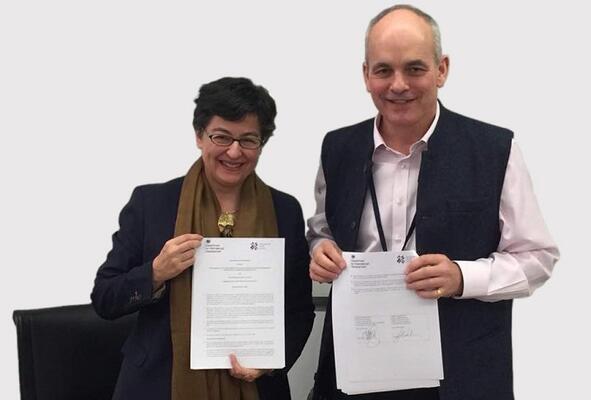
UK pledges additional funding to expand ITC’s SITA project
The United Kingdom of Great Britain and Northern Ireland, through its Department for International Development (DfID), has pledged an additional GBP 2.4 million in seed funding to the International Trade Centre’s Supporting Indian Trade and Investment for Africa (SITA) project. The funding will enable new spin-off initiatives and expand some existing activities within the SITA project. The Memorandum of Understanding was signed by ITC Executive Director Ms. Arancha González and Mr. Gavin McGillivray, head of the UK Department for International Development (DFID) Office in India, on 6 February 2018 at New Delhi, India.
Since project inception in 2014 the SITA project has facilitated over $70 million in investment flows from India and third countries, directly trained over 600 African farmers (and 16,000 indirectly) and supported more than 200 women entrepreneurs. SITA enhances South-South trade and investment cooperation between India and five East African countries (Ethiopia, Kenya, Rwanda, Uganda and United Republic of Tanzania), and across several priority sectors: pulses, spices, sunflower oil, coffee, information technology, leather and textiles and apparel.
SITA is identifying and testing innovative methods for promoting business exchange and knowledge transfer for developmental impact. The project now seeks to consolidate lessons learnt from its first three years into actionable pathways forward. The additional funding will allow SITA to build upon proven solutions to leverage Indian commercial knowledge and technology for sustainable development outcomes in East Africa.
Spin-off projects
The 10,000 Artisans: Transforming the Handloom Value Chain in Ethiopia project leverages the traditional handloom value chain in Ethiopia for employment generation, income multiplication, and social empowerment, with a particular focus on women. This will be done by supporting the development and incubation of micro, small and medium-sized ‘inclusive enterprises’ drawing on best practices from India. The intervention encompasses skilling, capacity-building, leadership training and market development over the course of five years and will directly benefit 10,000 artisans. The initial pilot will be carried out in Bahir Dar in the Amhara region, and is designed to be replicable within the country and eventually across East Africa.
Increasing agricultural productivity in Africa is critical to global and regional food security. Agribusiness services that improve value chain efficiency can incentivize productivity improvement and use of fallow land to generate social and economic returns. The Agriculture Infrastructure Company for Productivity Enhancement in Africa project will set up a for-profit agriculture infrastructure company (AIC). The AIC will address bottlenecks in current value chains by working directly with farmers. It will leverage its scale, local presence and global market understanding to deliver benefits to farmers. The proposed company will provide services in collective procurement, warehousing practices, training on modern agricultural practices, collateral management, product marketing and services to incentivize value addition.
Working with the Alliance for a Green Revolution in Africa (AGRA), the Strengthening the Pulses and Oilseeds Value Chains in East Africa project will focus on strengthening pulses and oilseeds sectors in Ethiopia, Kenya, Tanzania, Uganda, Malawi and Mozambique using the Value Chain Roadmaps as blueprints for a development trajectory. The project aims to reach over 1,000,000 farmers and will address bottlenecks from production to market indepth to increase returns to farmers and improve sustainability.
Expansion of existing activities
In addition, DfID funding will enable the expansion of a number of existing SITA projects such the Mitreeki East Africa-India Partnership, and facilitate further investment promotion activities across SITA target sectors. By the end of the funding cycle, SITA aims to facilitate more than $80 million in investment into East Africa and improve the business capacity of 600 women managers and entrepreneurs.



